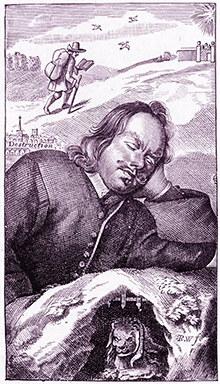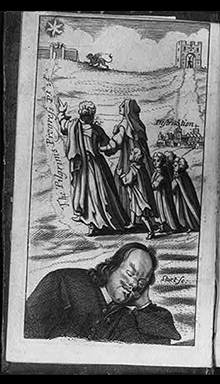
Title page of First Part

Title page for Second Part
 Title page of First Part |
 Title page for Second Part |
|
|
|
Illustrations from Fifteenth Edition (1682) New York Public Library Digital Collections: Illustrations for Pilgrim's Progress from this World, to that which is to Come: Delivered under the Similitude of a Dream. Where in Discovered, the Manner of his Setting Out, His Dangerous Journey, and Safe Arrival at the Desired Countrey, (London: Printed for N. Ponder, 1682). Robert McCrum, "The 100 Best Novels," The Guardian, 23 September 2013 William Blake (1757-1827), Illustrations (1824-27) for Pilgrim's Progress William Chalmers Burns, Tian lu li cheng (1856) Curiosity Collections, Harvard University The Wizard of Oz (Victor Fleming, 1939) Revival: Oral Roberts "Everything God Has Is Yours" (Salem, Oregon; 1957) John Wayne and "Pilgrim" in The Man Who Shot Liberty Valance (John Ford, 1962) John Wayne, McLintock! (Andrew V. McLaglen, 1963) Queen Elizabeth, c. 1592 (Marcus Gheeraerts the Younger, The Ditchley Portrait, c.1592, oil on canvas, 241.3 x 152.4cm; the National Portrait Gallery) Lil Nas X, "Montero (Call Me by Your Name)" (2021) Lil Nas X's"J Christ" (2024) Jon Caramanica, "Is This Lil Nas X's Final Troll?", New York Times, (17 January 2024). Campaign ad: "God Made Trump" (2023) |